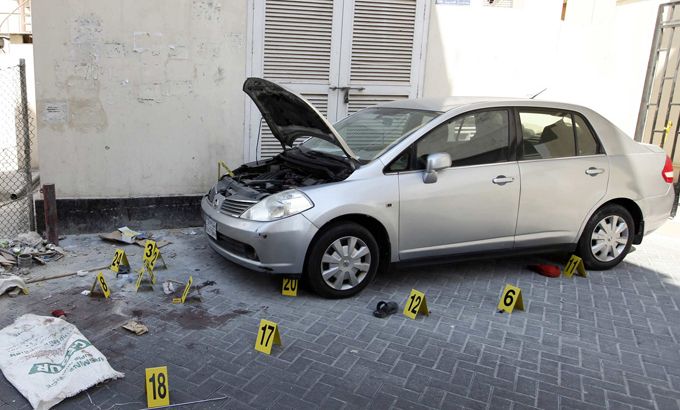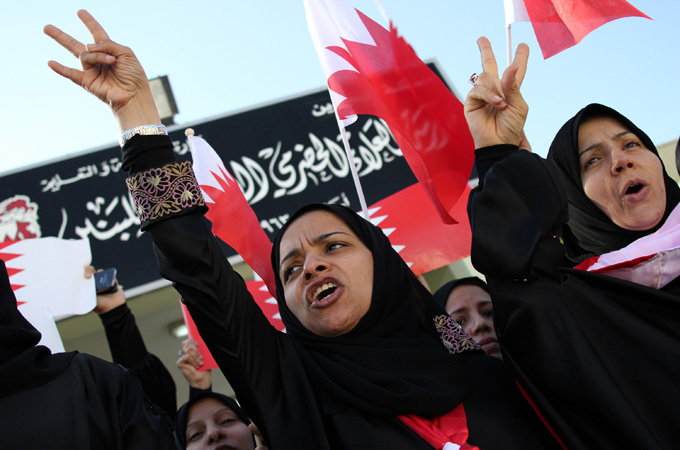Deadly blasts hit Bahrain’s capital
Two foreign workers killed and a third injured as five homemade explosive devices go off in Manama.

Two foreign workers have been killed in Bahrain’s capital Manama after a series of blasts went off, authorities say.
The interior ministry said at least five homemade explosive devices exploded on Monday and described the blasts as “terrorist acts” – its term for violence by opposition activists.
The apparently co-ordinated explosions point to escalating levels of violence in the nearly 21-month uprising against the Gulf kingdom’s rulers and come less than a week after Bahrain banned all protest gatherings in the country.
The official Bahrain News Agency said the explosions took place between 4.30am and 9.30am (01:30 and 06:30 GMT) in the Qudaibiya and Adliya districts of Manama.
|
“As always, we condemn violence but, given the Bahraini authorities’ background in spreading disinformation, we call for an independent investigation“ – Maryam al-Khawaja, |
One of the attacks occurred outside a cinema, where a street cleaner died when he kicked a package that blew up. The other man died from injuries in a separate blast, officials said, identifying the dead as a 29-year-old Indian and a 33-year-old Bangladeshi. Another Indian man was injured.
Rights group Amnesty International called for an independent investigation into Monday’s attacks. “…those responsible [must be] brought to justice in proceedings that comply with internationally recognised standards for fair trial and with no possibility of the death penalty,” a statement said.
Police have been targeted by explosions several times this year, as the government has stepped up efforts to quell an uprising that has simmered since protests broke out in early 2011.
But bombs targeting civilians are rare in the kingdom, where the Sunni Muslim Al Khalifa family rules over a majority Shia population.
‘Strange incident’
Opposition politician Matar Matar of the Shia party al-Wefaq said he doubted that opposition activists were behind Monday’s attacks.
He suggested the police or military might have been responsible, or a rogue unit.
“This incident is strange – why would anyone target workers?” he said. “I’m worried that police and military are losing control of their units or it is [preparation] before declaring martial law.”
Maryam al-Khawaja, acting head of the Bahrain Centre for Human Rights, said: “As always, we condemn violence but, given the Bahraini authorities’ background in spreading disinformation, we call for an independent investigation into the deaths of the two migrant workers.”
Khawaja, who is based in Denmark, said the attacks were “not grounds to start a campaign of collective punishment, arbitrary arrests, and torture, as we’ve see happen before”.
 |
| The army was called in to quell mass rallies in Manama last year[GALLO/GETTY] |
Foreign ministers from the Gulf Co-operation Council – made up of Bahrain, Kuwait, Oman, Qatar, Saudi Arabia and the United Arab Emirates – plan to meet in Manama on Wednesday to discuss regional issues.
The meeting will discuss Bahrain’s tensions and growing clashes in Kuwait between security forces and the opposition.
Thirty-five people were killed in Bahrain as the Shia-led opposition staged protests in February and March 2011 and the two months of martial law that followed. While mass protests in central Manama have been stamped out, clashes between protesters and riot police are still common in Shia districts.
Activists and rights groups say 50 civilians have been killed in the turmoil since the end of martial law, while the authorities say two policemen have died.
Shias make up about 70 per cent of Bahrain’s 525,000 citizens. They complain of discrimination in the electoral system, jobs, housing and education, and say they are mistreated by government departments, the police and the army.
Bahrain’s Western allies have urged renewed efforts at dialogue to ease the crisis, but opposition groups insist that talks cannot move forward unless the monarchy is willing to make greater concessions to loosen its hold on the country’s affairs.
Bahrain’s leaders have so far made reforms that include transferring more oversight powers to the elected parliament.